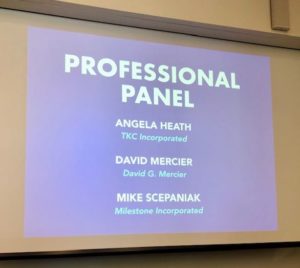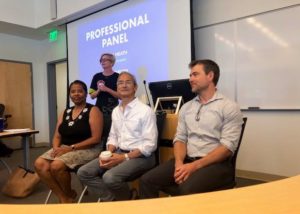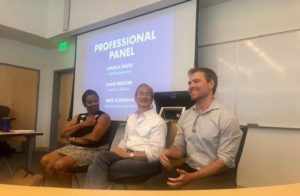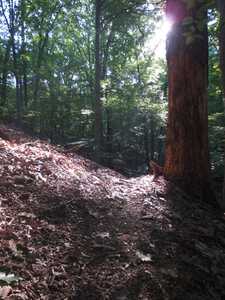When the number of people who do what you do is small, it’s easy to be considered an expert on it. That’s the conclusion I’ve come to after serving as an early retirement "expert" for a panel discussion. Fortunately, by all accounts, I held my own and lived up to the title/role.
Invitation
The other month, I received an email out of the blue from Laurie Churchman, an instructor at Johns Hopkins University’s Carey Business School in Baltimore, Maryland. Laurie teaches 3-day Executive Education seminars on Design Thinking. For each seminar, she chooses a challenge to focus the students' efforts. For the seminar she was reaching out to me about, the challenge was to be "reimagine retirement". In order to stoke the fire, Laurie starts each seminar with a panel discussion made up of subject matter experts. Laurie was asking me to serve as a panelist.
Given that I love talking about the topic of FIRE (Financial Independence and Retiring Early), I was tickled to be invited and quickly accepted. It also helped that the class was located a relatively short drive away, free parking was included, catered lunch was provided, and a small stipend was offered. Laurie stressed that serving as a panelist would not require any preparation.
A week before the class, Laurie sent an email to finalize the panelists and expectations. When I read the backgrounds of the other two panelists, I couldn’t help but smile at the mild ridiculousness of the situation I had found myself in. One of the other panelists was Angela Heath, an accomplished public speaker and book author. The remaining panelist was David Mercier, an accomplished life coach, accredited university instructor, and book author. Me? I was a retired software developer who had written one blog post about FIRE. Compared to my fellow panelists, not a whole lot of bona fides on my part.
But, I was definitely still game for the discussion and was looking forward to it. As icing on the cake, Laurie was gracious enough to allow me to invite two guests to the class - a FIRE-interested friend (Lisa) and my lovely Deborah.
Discussion
The panel discussion, itself, went great! Laurie started off the discussion by asking a question that essentially allowed for each panelist to briefly tell their story, especially as it related to reimagining retirement. From there, the students quickly took to asking questions, which drove the rest of the discussion. Both Angela and David were impressive with what they brought to the table - and I’m very proud to say that I held up my end. (Fortunately, with both Deborah and Lisa in attendance, I was able to confirm as much.)



The students definitely seemed to be interested in the subject and engaged in the discussion, as we exceeded the allotted time of 90 minutes. After the panel discussion wrapped up, Angela, David, and myself made our exits and Laurie continued on with her class. All three of the panelists were invited to return two days later to review the students' work, an offer which I accepted. The students divided up into 6 groups of ~6 students each. It was a pleasure watching and commenting-on the product/service/concept (all related to reimagining retirement) that each group presented.
In the end, Laurie seemed very pleased. In turn, I was pleased, too. I had been a bit skeptical with what "expertise" I would be able to bring to the discussion, but I shouldn’t have been. Expertise is relative. And the amount of reading I had done about FIRE- and the amount of living I had done doing it was plenty enough to carry me through a 90 minute discussion on it.
After it was all done, I went ahead and made a new addition to my resume - "professional speaker". Now that I think of it, maybe I should modify my title - replace "Software Development Consultant" with "Early Retirement Expert". Maybe it's time - Michael Scepaniak, FIRE Expert.
Transcript for Video #1
[Michael Scepaniak introducing himself to the audience.]
With regards to retirement, so I got divorced when I was around 35, and I'm now 44. So at that point in my life, I just kind of took stock of exactly what I was doing, what made me happy, and I just kind of centered... I focused more on early retirement, which I kind of discovered at that point there. With the internet, of course, any sub-community can kind of find its own tribe. And in recent years, maybe within the past decade or so, the concept of early retirement has really found its own voice. Maybe not in the mainstream so far yet, but definitely amongst a critical mass of people online.
And I kind of latched on to that and decided, yeah, I think I can do that and really kind of restructured my life around that. And at the beginning of January 1st, 2018, I retired. I considered it to be an experiment. I'm a software developer, very much an agile, so I looked at it as learn as I go - course correct. And now it's been a year and a half later. And it was really only last month, May, that I kind of looked at tax returns and how are things going and said, the experiment's over, it's working. And I consider myself retired. And that's what brought me here today. Thank you, Laurie.
[End of transcript]
Transcript for Video #2
[Michael Scepaniak responding to a question from the audience.]
So it's interesting - you brought up the terminology. Just two days ago, I was applying for a home equity line of credit, just as an emergency source of funds. Just in case. I wasn't going to use it. I was filling out the application and it said "What's your employment status?". Retired was an option, and I didn't put retired. I put "self-employed".
[laughter from audience]
It's partially because... well, as soon as they see "retired", they're going to think of me in a certain way. I don't want them to think of me in that certain way. I put self-employed, which is true. I work for myself. The corporation is still there. I just don't work.
[laughter from audience]
It's interesting. It's very murky. I still have income, but it's all passive. So my income is... I have a dividend-paying portfolio of individual stocks. Amongst the FIRE crowd, ETFs are the big thing. It's all about exchange-traded funds - just basically tracking the S&P 500. Many studies have proven it's a good way to go. Personally, I eschew that. I'd like to get a few extra points of interest from dividends that I actually pick. So, my income needs are fairly minimal. I think last year I lived off of... it's around $40,000 a year. Nothing extravagant.
And as far as what I do, it's simplistically whatever I want to do. But the things that I've been... Whenever anybody asks me that question, I always feel like I'm at a loss - because I'm not really sure exactly what I've been doing for the past year and a half. [laughter from audience] And I've actually said to my lovely Deborah here, I said to her one time "I don't feel like I've done anything". And she looks at me - "You're busy all the time! I don't know how you feel like you've not done anything."
But it's partially because... Most people, when they think about what they've accomplished, they can look at their job and they can think about the projects that they've been working on recently, and they can say, "Oh yeah, that finished up in June. and I'm working on this project right now. And that's really a bear." and whatever. It's something that you could easily go to. You have status reports and constantly something you're reporting and communicating to. And now, the only person you're communicating to is yourself. I don't feel like keeping records of this stuff. I'm just gonna' do it.
So, it's really interesting. That's why I keep on stressing the point that you really have to be really self-directed at this kind of stuff because you can get completely adrift without the structure. And I'm okay not having a... If I really needed to go back, I can go back and I can look at everything that I did and I can say "Oh, yeah, I spent several weeks on that and... Oh yeah, I did that." and it could be very satisfying. But, I'm okay not being able to tell you right now exactly what... I've been gearing up for this [panel discussion] for a while, it's like "Oh, this could be cool. I'm really excited about this."
[laughter from audience]
[End of transcript]

Leave a comment
All comments are subject to review, so there will be a delay before they appear. You may include Markdown in your comment. I use the Akismet filtering service to reduce spam. Learn how Akismet processes comment data.